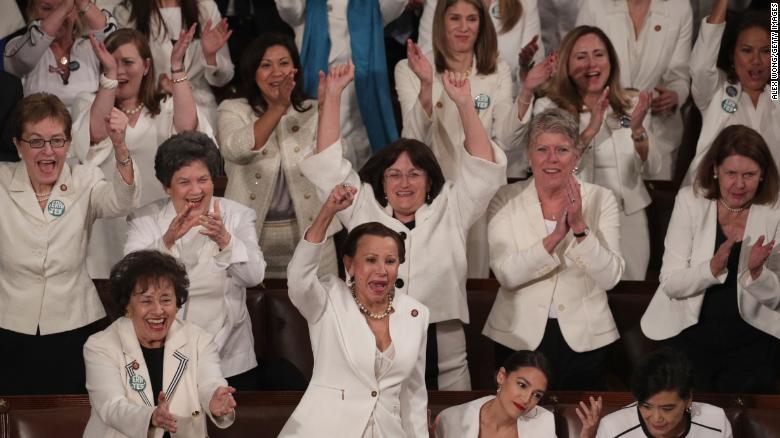The official “Year of the Woman” was over a quarter-century ago. In 1992, America elected a record-breaking four female senators and 24 female representatives to Congress.
However, an overwhelming surge in females running for office in 2018 led journalists to dub
the 2018 midterms as the second “Year of the Woman”—with a record 36 women elected to
the House of Representatives for the first time, including the first two Muslim and first two
Native American congresswomen.
the 2018 midterms as the second “Year of the Woman”—with a record 36 women elected to
the House of Representatives for the first time, including the first two Muslim and first two
Native American congresswomen.
This uptick in women winning elections is a trend unlikely to stop. As we see Congress inching
towards gender-balance, it is worth wondering how a Congress with equal male and female representation
would operate. And to predict the future, it is helpful to first look at how women have performed in the past.
towards gender-balance, it is worth wondering how a Congress with equal male and female representation
would operate. And to predict the future, it is helpful to first look at how women have performed in the past.
The 2013 Government Shutdown is an obvious first place to look. After disagreements about healthcare led
to a 16-day stalemate, it was a female senator who led the way to compromise. Republican Susan Collins of Maine
drafted a plan to end the standoff, recruiting colleagues from both sides of the aisle to collaborate. Her bipartisan
group of 14 senators included six women—representing 30 percent of the total number of women in the Senate.
to a 16-day stalemate, it was a female senator who led the way to compromise. Republican Susan Collins of Maine
drafted a plan to end the standoff, recruiting colleagues from both sides of the aisle to collaborate. Her bipartisan
group of 14 senators included six women—representing 30 percent of the total number of women in the Senate.
What happened in 2013 is tangible evidence for what researchers have been saying for years.
Countless studies have found that female leaders place a much greater emphasis on collaboration
and teamwork. While men are more inclined to lead with a win-lose-or-compromise strategy,
women are uniquely capable of boosting collaboration and achieving win-win outcomes.
Countless studies have found that female leaders place a much greater emphasis on collaboration
and teamwork. While men are more inclined to lead with a win-lose-or-compromise strategy,
women are uniquely capable of boosting collaboration and achieving win-win outcomes.
In fact, one team of researchers found congresswomen to be more effective at their jobs than
congressmen—bringing more federal dollars to their home districts and sponsoring more legislation than
their male colleagues.
congressmen—bringing more federal dollars to their home districts and sponsoring more legislation than
their male colleagues.
All this boils down to networking. Take Brazil’s Chamber of Deputies as an example (roughly
the equivalent of our House of Representatives). Two researchers concluded that the women
had far stronger relationships than the male Deputies—giving the women a competitive edge
in the male-dominated environment.
the equivalent of our House of Representatives). Two researchers concluded that the women
had far stronger relationships than the male Deputies—giving the women a competitive edge
in the male-dominated environment.
We know that congresswomen are better collaborators and have stronger relationships than
congressmen, but it's hard not to wonder if that trend will continue when women no longer
have to compete as a minority voice. Will the unique power of congresswomen fade away once they
hold equal power with their male colleagues?
congressmen, but it's hard not to wonder if that trend will continue when women no longer
have to compete as a minority voice. Will the unique power of congresswomen fade away once they
hold equal power with their male colleagues?
I suppose only time will tell.



It is interesting to hear that more women are able to use strategies and characteristics surrounding teamwork and collaboration. I believe that when women are able to be recognized matched against a man, they can emphasize that they are teamwork-focused and that the world needs to work together (as a team) for the most successful future. :)
ReplyDeleteI really enjoyed reading your post - it has good flow and you picked great pictures to go along with it! As for the topic, I really do hope that we will have equal representation in the near future. It has definitely been a few rough years for politics and hopefully this will change with the addition of more women.
ReplyDelete